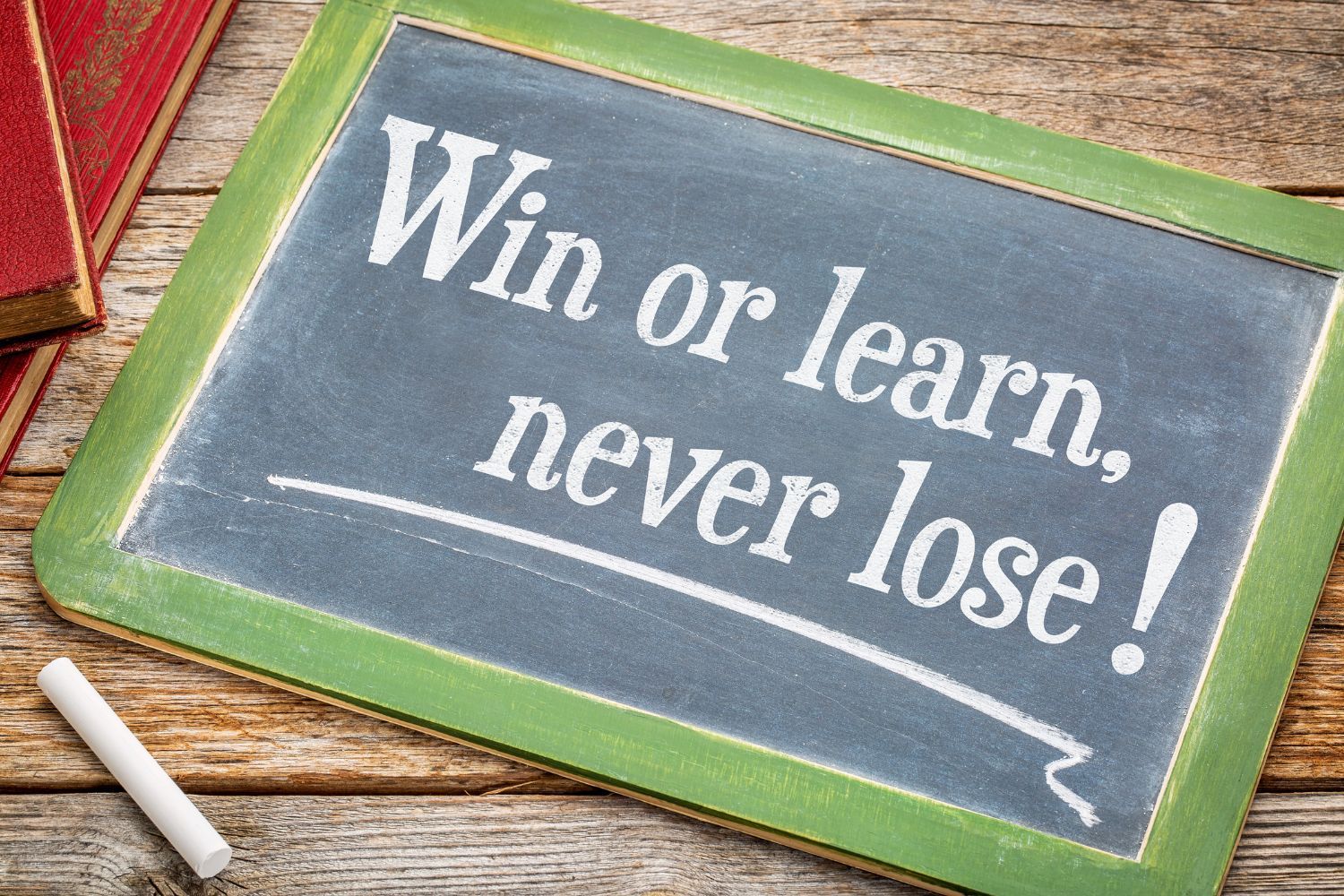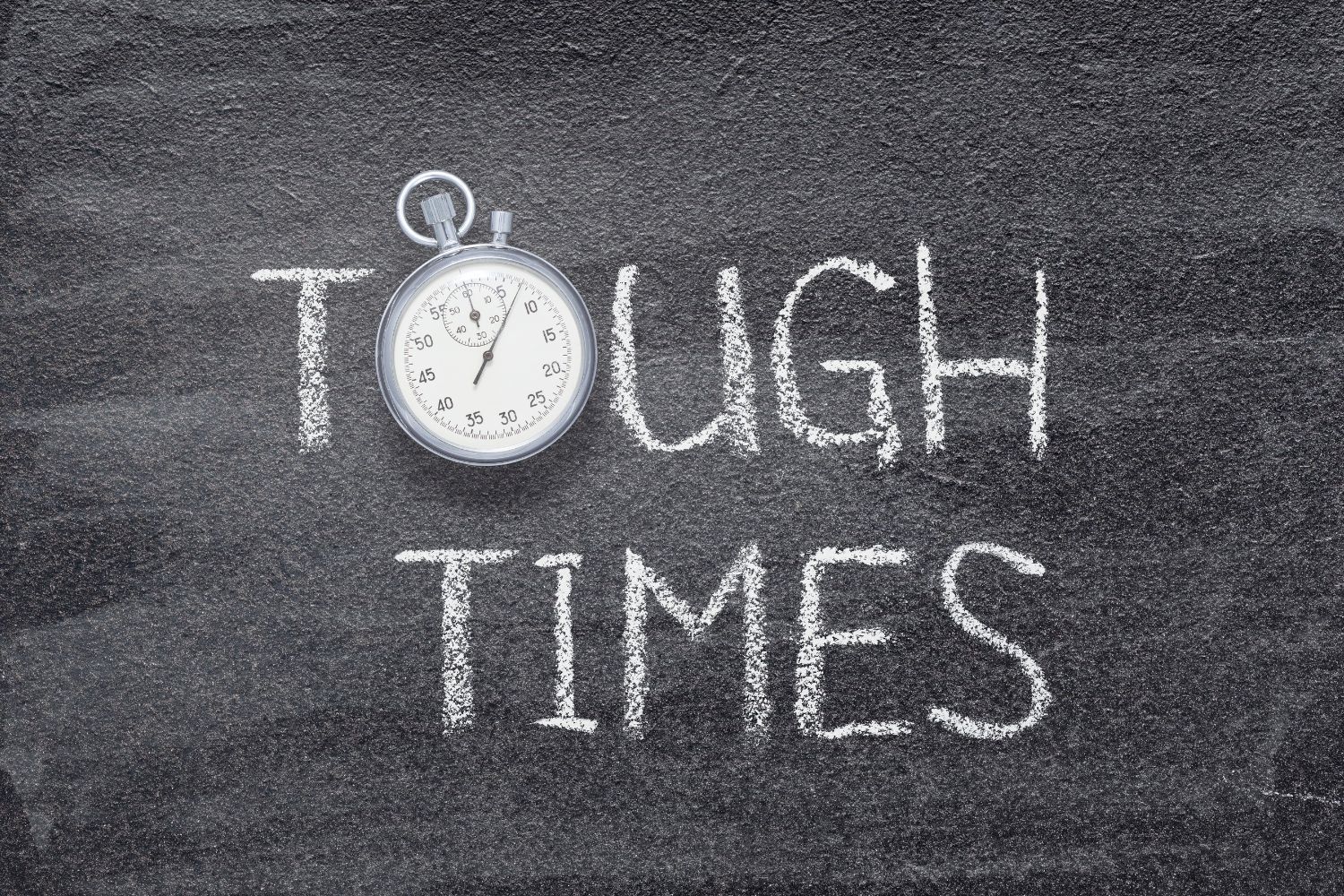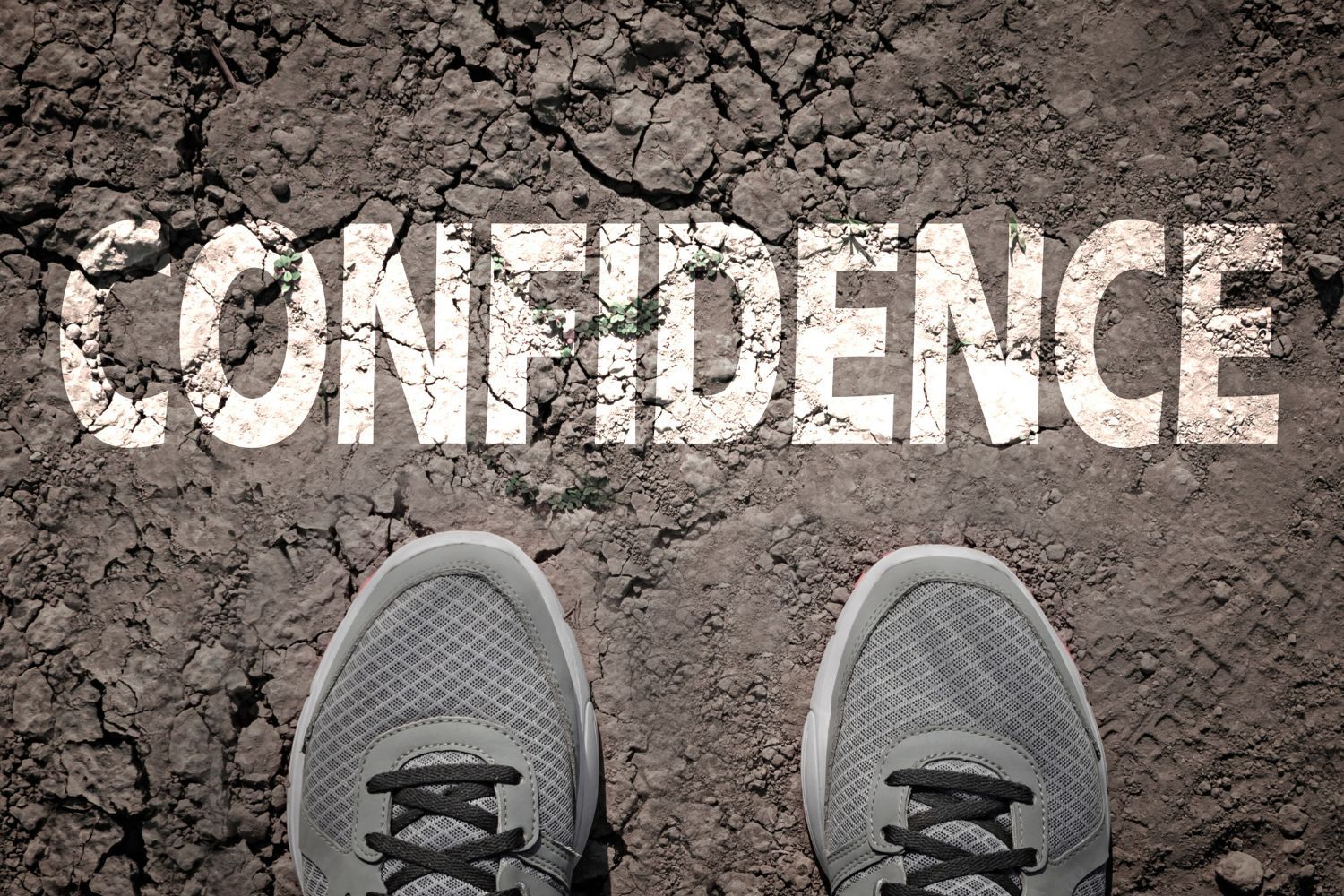"I Win or I Learn" The Art of Resilience
Grow from your mistakes and become better

"I Win or I Learn" The Art of Resilience
In today's society, the ability to bounce back from adversity is a key ingredient for success. People who have high levels of resilience are more likely to have fulfilling and successful careers.
The key to resilience is to see failure as a learning opportunity. People who are resilient see setbacks as a chance to grow and learn. They view failure as a temporary event, not as a permanent reflection of their worth.
People who are resilient are not afraid to take risks. They know that taking risks is essential for growth. They are also willing to put in the hard work required to achieve their goals.
People who are resilient are able to maintain a positive outlook, even in the face of adversity. They know that they can overcome any obstacle if they remain positive and focused.
The ability to be resilient is a learned skill. It is something that you can develop with practice. If you want to become more resilient, start by looking at failure as a learning opportunity. Put in the hard work required to achieve your goals, and maintain a positive outlook, even when things are tough.
1. Definition of the term "resilience."
2. The importance of resilience.
3. The "I win or I learn" Philosophy.
4. How the "I win or I learn" philosophy can help build resilience.
5. Tips for putting "I win or I learn" into practice.
6. Inspiring stories of people who have applied "I win or I learn" in their lives.
7. Start using "I win or I learn" in your own life.
1. Definition of the term "resilience."
In psychology, resilience is the process of adapting well in the face of adversity, trauma, tragedy, threats or significant sources of stress. It means "bouncing back" from difficult experiences.
Resilience is not a trait that people either have or do not have. It involves behaviours, thoughts and actions that can be learned and developed by anyone.
Some people are more resilient than others, and that is often because they have had more practice. They have developed skills and strategies for dealing with difficult situations. They know how to ask for help when they need it and they have a support network of family and friends they can rely on.
Resilience is a key ingredient in our mental and physical health. It helps us to cope with difficult times and to bounce back from setbacks.
2. The importance of resilience.
In order to achieve success in any field, it is essential to be resilient. Resilience is the ability to recover from setbacks, adapt to change, and keep going in the face of adversity. It is a essential quality for anyone who wants to achieve their goals.
When things go wrong, it is easy to give up and feel like a failure. However, resilient people are able to pick themselves up and keep going. They see setbacks as an opportunity to learn and grow. resilient people are also able to adapt to change. They are flexible and able to roll with the punches.
Being resilient is not easy. It takes practice and perseverance. However, it is a quality that can be developed. There are many resources available to help you build resilience. Books, articles, and websites all offer helpful advice.
The most important thing is to keep trying. When you fall down, get back up. When you make a mistake, learn from it. And always keep moving forward.
3. The "I win or I learn." philosophy.
When it comes to learning from our mistakes, it's often said that there are only two options: we either win or we learn. This idea is known as the "I win or I learn" philosophy, and it's a powerful way to approach life.
The "I win or I learn" philosophy is all about embracing mistakes and viewing them as opportunities for growth. It's about having the mindset that there are no losses, only lessons.
This philosophy can be applied to any area of life, whether it's our personal relationships, our careers, or our businesses. Whenever we make a mistake, we can choose to see it as a setback or we can choose to see it as an opportunity to learn and grow.
The beauty of the "I win or I learn" philosophy is that it takes the pressure off of ourselves to be perfect. We all make mistakes, and that's okay. What matters is how we respond to our mistakes. Do we let them defeat us, or do we use them as fuel to become better versions of ourselves?
The next time you make a mistake, I encourage you to try out the "I win or I learn" philosophy. See it as an opportunity to grow and learn, and I guarantee you'll be amazed at the results.
4. How the "I win or I learn" philosophy can help build resilience.
When you adopt the philosophy of "I win or I learn", you realize that there are no losses, only lessons. This helps you to approach each situation with a positive outlook and open mind, which are essential for building resilience.
When you focus on the lesson instead of the loss, you are more likely to see the situation as an opportunity to grow and learn. This positive attitude will help you to recover from setbacks more quickly and build the resilience you need to deal with whatever life throws your way.
It is also important to remember that everyone experiences setbacks and failures at times. The ability to learn from these experiences and come out stronger is what separates the successful from the unsuccessful.
By adopting the "I win or I learn" philosophy, you are setting yourself up for success by acknowledging that there are no losses, only lessons to be learned. This positive outlook will help you to build the resilience you need to achieve your goals.
5. Tips for putting "I win or I learn" into practice.
When it comes to learning how to become more resilient, often it is helpful to have some guidance and tips to get started. Here are five ways that you can start putting the "I win or I learn" philosophy into practice in your own life:
Acknowledge your mistakes. One of the first steps to becoming more resilient is to be honest with yourself and acknowledge when you make a mistake. Only by recognising your mistakes can you learn from them and move on.
Don't dwell on your failures. It is important to not dwell on your failures, but to instead learn from them and move on. When you dwell on your failures, you are only setting yourself up for more disappointment and frustration.
Set realistic goals. When you set realistic goals, you are more likely to achieve them and feel good about yourself in the process. On the other hand, if you set unrealistic goals, you are likely to only feel disappointed and discouraged.
Be persistent. If at first you don't succeed, try, try again! Be persistent in pursing your goals and don't give up easily.
Learn from your mistakes. Whenever you make a mistake, take the time to learn from it. What went wrong? What could you do differently next time? By learning from your mistakes, you can become stronger and more resilient.
6. Inspiring stories of people who have applied "I win or I learn" in their lives.
The "I win or I learn" mantra is one that can be applied to any situation in life. Whether you're facing a personal challenge or trying to achieve a professional goal, adopting this mindset can help you overcome obstacles and achieve success.
There are countless stories of people who have overcome challenges and achieved great things by applying this mantra to their lives. Here are just a two examples:
When J.K. Rowling was struggling to get published, she was told "no" over and over again. But she didn't give up. She kept writing and eventually found a publisher for her now-famous Harry Potter series.
When Oprah Winfrey was fired from her first job as a news anchor, she could have seen it as a setback. Instead, she used it as an opportunity to pursue her true passion: talk show hosting. And the rest, as they say, is history.
These stories show that no matter what challenges you face, you can overcome them by applying the "I win or I learn" mantra to your life. So don't give up on your dreams – keep moving forward, and you'll eventually achieve them.
7. Start using "I win or I learn" in your own life.
I encourage you to start using the phrase "I win or I learn" in your own life. To do this, we will first discuss what the phrase means and why it is beneficial. I will then provide some tips on how to start using it in your own life.
When we face adversity, it is easy to become fixated on the outcome. We often see adversity as a black-and-white situation: we either win or we lose. However, this fixed mindset can actually hinder our ability to overcome adversity. Instead of seeing adversity as a win or lose situation, we should instead try to see it as an opportunity to learn.
The phrase "I win or I learn" is a great way to remind yourself of this mindset. It means that regardless of the outcome, you will take something away from the experience. This attitude is beneficial for two reasons. First, it allows you to approach adversity with a positive attitude. Second, it means that you are always learning and growing, even when things don't go your way.
So how can you start using "I win or I learn" in your own life? Here are a few tips:
1. Use it as a mantra. When you're facing adversity, repeat the phrase "I win or I learn" to yourself. This will help you stay focused on the positive and remind you that you can always learn from the experience.
2. Write it down. Whenever you face adversity, take a moment to write down what you learned. This will help you solidify the lessons in your mind and provide you with a tangible reminder of your progress.
3. Share it with others. When you overcome adversity, share your story with others. This will inspire them to adopt the same mindset and help them see that anything is possible.
4. Use it as motivation. Whenever you feel like giving up, remember that you can always learn from the experience. Use this phrase as motivation to keep going and never give up on your dreams.
In conclusion, it is evident that the ability to bounce back from setbacks is a critical life skill. While it is not always easy to do, developing resilience can mean the difference between success and failure. As J.K. Rowling so famously said, "Rock bottom became the solid foundation on which I rebuilt my life."
When we embrace the philosophy of "I win or I learn," we give ourselves the opportunity to grow from our mistakes and become better, stronger people as a result.
In today's society, the ability to bounce back from adversity is a key ingredient for success. People who have high levels of resilience are more likely to have fulfilling and successful careers.
The key to resilience is to see failure as a learning opportunity. People who are resilient see setbacks as a chance to grow and learn. They view failure as a temporary event, not as a permanent reflection of their worth.
People who are resilient are not afraid to take risks. They know that taking risks is essential for growth. They are also willing to put in the hard work required to achieve their goals.
People who are resilient are able to maintain a positive outlook, even in the face of adversity. They know that they can overcome any obstacle if they remain positive and focused.
The ability to be resilient is a learned skill. It is something that you can develop with practice. If you want to become more resilient, start by looking at failure as a learning opportunity. Put in the hard work required to achieve your goals, and maintain a positive outlook, even when things are tough.
1. Definition of the term "resilience."
2. The importance of resilience.
3. The "I win or I learn" Philosophy.
4. How the "I win or I learn" philosophy can help build resilience.
5. Tips for putting "I win or I learn" into practice.
6. Inspiring stories of people who have applied "I win or I learn" in their lives.
7. Start using "I win or I learn" in your own life.
1. Definition of the term "resilience."
In psychology, resilience is the process of adapting well in the face of adversity, trauma, tragedy, threats or significant sources of stress. It means "bouncing back" from difficult experiences.
Resilience is not a trait that people either have or do not have. It involves behaviours, thoughts and actions that can be learned and developed by anyone.
Some people are more resilient than others, and that is often because they have had more practice. They have developed skills and strategies for dealing with difficult situations. They know how to ask for help when they need it and they have a support network of family and friends they can rely on.
Resilience is a key ingredient in our mental and physical health. It helps us to cope with difficult times and to bounce back from setbacks.
2. The importance of resilience.
In order to achieve success in any field, it is essential to be resilient. Resilience is the ability to recover from setbacks, adapt to change, and keep going in the face of adversity. It is a essential quality for anyone who wants to achieve their goals.
When things go wrong, it is easy to give up and feel like a failure. However, resilient people are able to pick themselves up and keep going. They see setbacks as an opportunity to learn and grow. resilient people are also able to adapt to change. They are flexible and able to roll with the punches.
Being resilient is not easy. It takes practice and perseverance. However, it is a quality that can be developed. There are many resources available to help you build resilience. Books, articles, and websites all offer helpful advice.
The most important thing is to keep trying. When you fall down, get back up. When you make a mistake, learn from it. And always keep moving forward.
3. The "I win or I learn." philosophy.
When it comes to learning from our mistakes, it's often said that there are only two options: we either win or we learn. This idea is known as the "I win or I learn" philosophy, and it's a powerful way to approach life.
The "I win or I learn" philosophy is all about embracing mistakes and viewing them as opportunities for growth. It's about having the mindset that there are no losses, only lessons.
This philosophy can be applied to any area of life, whether it's our personal relationships, our careers, or our businesses. Whenever we make a mistake, we can choose to see it as a setback or we can choose to see it as an opportunity to learn and grow.
The beauty of the "I win or I learn" philosophy is that it takes the pressure off of ourselves to be perfect. We all make mistakes, and that's okay. What matters is how we respond to our mistakes. Do we let them defeat us, or do we use them as fuel to become better versions of ourselves?
The next time you make a mistake, I encourage you to try out the "I win or I learn" philosophy. See it as an opportunity to grow and learn, and I guarantee you'll be amazed at the results.
4. How the "I win or I learn" philosophy can help build resilience.
When you adopt the philosophy of "I win or I learn", you realize that there are no losses, only lessons. This helps you to approach each situation with a positive outlook and open mind, which are essential for building resilience.
When you focus on the lesson instead of the loss, you are more likely to see the situation as an opportunity to grow and learn. This positive attitude will help you to recover from setbacks more quickly and build the resilience you need to deal with whatever life throws your way.
It is also important to remember that everyone experiences setbacks and failures at times. The ability to learn from these experiences and come out stronger is what separates the successful from the unsuccessful.
By adopting the "I win or I learn" philosophy, you are setting yourself up for success by acknowledging that there are no losses, only lessons to be learned. This positive outlook will help you to build the resilience you need to achieve your goals.
5. Tips for putting "I win or I learn" into practice.
When it comes to learning how to become more resilient, often it is helpful to have some guidance and tips to get started. Here are five ways that you can start putting the "I win or I learn" philosophy into practice in your own life:
Acknowledge your mistakes. One of the first steps to becoming more resilient is to be honest with yourself and acknowledge when you make a mistake. Only by recognising your mistakes can you learn from them and move on.
Don't dwell on your failures. It is important to not dwell on your failures, but to instead learn from them and move on. When you dwell on your failures, you are only setting yourself up for more disappointment and frustration.
Set realistic goals. When you set realistic goals, you are more likely to achieve them and feel good about yourself in the process. On the other hand, if you set unrealistic goals, you are likely to only feel disappointed and discouraged.
Be persistent. If at first you don't succeed, try, try again! Be persistent in pursing your goals and don't give up easily.
Learn from your mistakes. Whenever you make a mistake, take the time to learn from it. What went wrong? What could you do differently next time? By learning from your mistakes, you can become stronger and more resilient.
6. Inspiring stories of people who have applied "I win or I learn" in their lives.
The "I win or I learn" mantra is one that can be applied to any situation in life. Whether you're facing a personal challenge or trying to achieve a professional goal, adopting this mindset can help you overcome obstacles and achieve success.
There are countless stories of people who have overcome challenges and achieved great things by applying this mantra to their lives. Here are just a two examples:
When J.K. Rowling was struggling to get published, she was told "no" over and over again. But she didn't give up. She kept writing and eventually found a publisher for her now-famous Harry Potter series.
When Oprah Winfrey was fired from her first job as a news anchor, she could have seen it as a setback. Instead, she used it as an opportunity to pursue her true passion: talk show hosting. And the rest, as they say, is history.
These stories show that no matter what challenges you face, you can overcome them by applying the "I win or I learn" mantra to your life. So don't give up on your dreams – keep moving forward, and you'll eventually achieve them.
7. Start using "I win or I learn" in your own life.
I encourage you to start using the phrase "I win or I learn" in your own life. To do this, we will first discuss what the phrase means and why it is beneficial. I will then provide some tips on how to start using it in your own life.
When we face adversity, it is easy to become fixated on the outcome. We often see adversity as a black-and-white situation: we either win or we lose. However, this fixed mindset can actually hinder our ability to overcome adversity. Instead of seeing adversity as a win or lose situation, we should instead try to see it as an opportunity to learn.
The phrase "I win or I learn" is a great way to remind yourself of this mindset. It means that regardless of the outcome, you will take something away from the experience. This attitude is beneficial for two reasons. First, it allows you to approach adversity with a positive attitude. Second, it means that you are always learning and growing, even when things don't go your way.
So how can you start using "I win or I learn" in your own life? Here are a few tips:
1. Use it as a mantra. When you're facing adversity, repeat the phrase "I win or I learn" to yourself. This will help you stay focused on the positive and remind you that you can always learn from the experience.
2. Write it down. Whenever you face adversity, take a moment to write down what you learned. This will help you solidify the lessons in your mind and provide you with a tangible reminder of your progress.
3. Share it with others. When you overcome adversity, share your story with others. This will inspire them to adopt the same mindset and help them see that anything is possible.
4. Use it as motivation. Whenever you feel like giving up, remember that you can always learn from the experience. Use this phrase as motivation to keep going and never give up on your dreams.
In conclusion, it is evident that the ability to bounce back from setbacks is a critical life skill. While it is not always easy to do, developing resilience can mean the difference between success and failure. As J.K. Rowling so famously said, "Rock bottom became the solid foundation on which I rebuilt my life."
When we embrace the philosophy of "I win or I learn," we give ourselves the opportunity to grow from our mistakes and become better, stronger people as a result.
Related BLOGS

Tips for Budding Entrepreneurs: How to Turn Your Idea Into a Reality
Have you ever had a great business idea but didn't know how to get started? Well, you're not alone. Registering your business, building a brand, and acquiring customers are just a few of the challenges you'll face as a budding entrepreneur.

Tough Times Never Last, But Tough People Do!
When it comes to life, there are always going to be tough times. This is something that every single person has to go through. It is inevitable. What separates the people who make it through the tough times and those who don’t is how they handle it. The people who make it through are the ones who are tough.

How To: Boost Your Confidence
If you're lacking in self-confidence, it can hold you back from achieving great things. But the good news is that there are things you can do to change that. By taking some simple steps, you can learn how to boost your confidence and start living the life you want.
First, it's important to understand what confidence is and where it comes from. Confidence is the belief that you can do something, regardless of whether or not you've actually done it before. It comes from having a positive outlook and trusting in your abilities.







